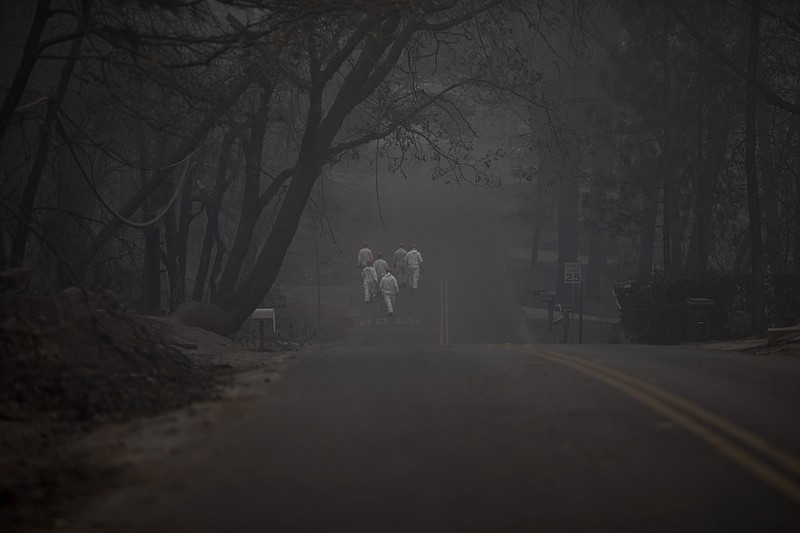Right here at home
In 1960, Chattanoogans could expect about 22 days a year when the temperature would reach at least 90 degrees. Today we can expect 32 days a year at or above 90 degrees, and by the end of the century, models show there could be 44 to 80 of those very hot days.Source: An analysis by the Climate Impact Lab, a group of climate scientists, economists and data analysts.
That was how President Donald Trump dismissed the core conclusion of a scientific report issued by his own administration: Climate change will destroy the nation's economy.
"Right now we're at the cleanest we've ever been, and that's very important to me," he said. "But if we're clean but every other place on Earth is dirty, that's not so good. So I want clean air. I want clean water. Very important."
He sounds like a recalcitrant 11-year-old arguing he isn't going to clean his room because no other room in the house is spotless. And even as he denies the scientific reality of climate change, he pushes policies that will increase the emissions of heat-trapping greenhouse gases and speed up the mess.
The new report, mandated by law, is the National Climate Assessment. Issued the day after Thanksgiving, it was the work of 13 federal agencies charged with updating climate change progress and recommendations every four years. The report's conclusion is damming, but not new: "Earth's climate is now changing faster than at any point in the history of modern civilization, primarily as a result of human activities" and "the severity of future impacts will depend largely on actions taken to reduce greenhouse gas emissions."
The impacts include more devastating wildfires, severe storms, coastal flooding, droughts, crop failures, water shortages, threats to public health and the loss of hundreds of billions of dollars to the American economy. The authors say if we don't take steps to slow global warming, the change will shave off as much as 10 percent of America's economy by the century's end - more than double the losses of the Great Recession a decade ago.
But Trump and his swamp have moved full speed ahead to allow more greenhouse gas emissions by weakening the Obama-era regulations meant to reduce pollution at its source - the smokestacks of power plants and tailpipes of automobiles. They argue that deregulation will spur economic growth.
Here's what they are really doing:
» The Obama administration's Clean Power Plan was designed to cut the greenhouse pollution of power plants by 32 percent below 2005 levels by 2030 - the equivalent of preventing more than 365 million metric tons of carbon dioxide from entering the atmosphere.
The Trump administration's replacement, the Affordable Clean Energy rule, was introduced in August and aims to cut emissions from 2005 levels by 0.7 to 1.5 percent by 2030.
» In 2012, the Obama administration required automakers to nearly double the fuel economy of passenger vehicles to an average of about 54 miles per gallon by 2025 - effectively cutting about six billion tons of greenhouse gas pollution.
In August, Trump proposed to weaken that rule, freezing average fuel economy at about 37 miles per gallon. The change could increase tailpipe pollution by up to a billion tons over 2012 levels.
» Obama's EPA required oil and gas companies to repair and monitor methane leaks in wells because methane is 25 times more powerful than carbon dioxide in its ability to trap heat in the atmosphere. The Obama rule would have prevented the equivalent of 11 million tons of CO2 from entering the atmosphere by 2025.
Trump's EPA and Interior Department want to weaken not only the standard, but also loosen restrictions on "flaring," the burning of methane from drilling operations.
» Obama's pledge for the Paris Climate Pact was to cut America's carbon at least 26 percent below 2005 levels by 2025.
Trump has announced that America is withdrawing from the agreement, and with all his regulation rollbacks has effectively ensured that the U.S. will stop all efforts to meet the goal. With no leadership from America, some of other 175 countries that signed the pact are pulling back as well.
Trump's administration tried to bury the 1,656-page assessment by releasing it over the long Thanksgiving holiday, but the effort backfired. Without the usual fire hose of news, journalists pounced on the report that talks of climate change's devastating effect on the economy, health and environment - more record wildfires in California, crop failures in the Midwest and crumbling infrastructure in the South. Going forward, American exports and supply chains could be disrupted, agricultural yields could fall to 1980s levels by midcentury and fire season could spread to the Southeast, according to the report.
The report also offers a price tag for doing nothing: $141 billion from heat-related deaths, $118 billion from sea level rise and $32 billion from infrastructure damage by the end of the century, among others things.
But the real danger from the Trump Administration's denial may also be the nation's loss of urgency in the kind of new and entrepreneurial opportunities that grow from finding solutions.
And there are solutions.
The report touts three: putting a price - a tax or a fee - on greenhouse gas emissions; establishing government regulations on how much greenhouse pollution can be emitted; and spending public money on clean-energy research.
It's a shame that Trump lacks the business sense to see the future, but we don't have to elect him or any more politicians like him.
